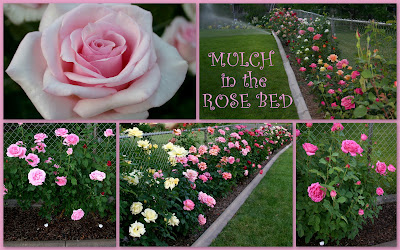If you want a way to save yourself from hours of weeding and watering, MULCH is the answer! Mulch has many benefits for your beds: It provides a great buffer layer between your soil and the elements above it. It keeps the weeds from getting the light they need to grow, and for those that do grow, their roots don't really get a foothold, and so they are very easy to pull out. Mulch is really anything you can use to cover your soil and improve your plant growth--there are organic mulches, including chopped leaves, bark, straw, or thin layers of grass clippings. They decompose into humus, and greatly increases your soil's structure and fertility. And there are inorganic mulches, such as sheet plastic or landscaping fabric covered with decorative material. They reduce weed problems, keep the soil cool and moist, and reduce erosion. Another neat thing about mulch is that it provides great climate control for your plants. It insulates the soil from hot summer temperatures. Some plants, like clematis, need full sun for their vines and flowers, but need their roots mulched to keep them moist and cool. Mulch shades the soil and actually conserves soil moisture. Then as colder temperatures come, the mulched soil stays warmer than unmulched soil, and can actually extend the growing season by several weeks. This is great for fall-planted perennials, which may need extra time for their root systems to develop before freezing weather arrives. Mulch also is very helpful for fluctuating winter temperatures--freezing and thawing, which contributes to heaving. This isn't a big problem when you mulch. Another neat thing about mulch is that rains can penetrate easily to moisten the soil below. I have my soaker hoses below the mulch, and so the soil gets thoroughly watered in dry spells. So, to summarize, mulches help in many ways, including:
- Mulches keep the soil moist longer by slowing the evaporation process to almost nothing
- It softens the impact of pelting rain, reducing soil compaction, erosion and nutrient leaching
- Mulch keeps mud from splashing on plant foliage, which reduces the spreading of many plant diseases
- Mulch can help to filter out fungal spores that can be washed to the ground by heavy rains, like the fungus that causes rose blackspot
- Mulched soils stay loose and crumbly instead of becoming hard-packed and crusted, which causes shallow roots
If you use lawn clippings, let them dry out before using, in about a 4-inch layer. They can also help build soil structure. If chopped leaves are what you're using, chop or compost them so they don't mat down. Put them on in late fall or early winter in a 3-inch layer. Leaves also build soil up. If pine needles are what you want to use, put down 2-4", but pine needles do tend to acidify the soil. They are especially good to use for acid-loving plants, like hydrangea, and act as a soil builder as well. Bark nuggets don't help to build soil, but are more decorative, and very easy to use. This is what I use the most. I have bark along the perimeter of the yard where I have a long row of roses. It keeps this bed weed-free, which is great because I don't need to worry about getting pricked by thorns to weed. It also helps to insulate them in our harsh Utah winters. Apply bark in a 2-3" layer, being careful not to to get it too close to the main stem of your plant--leaving 2-3" space. You can use straw or hay, but I think it's messy, and they contain more weed seeds, and I also didn't like it when the wind blew it all around the yard. You also have to put down about 6" , which is another reason I found it not too fun to use. I've seen some people use newspaper, but it needs to be covered with some type of decorative material, like pebbles or rock. And then, of course, there are the plastic sheeting and landscape fabrics that you put down and cover with rocks, pebbles or decorative material. I really don't like using these for areas with growing plants, however. I think by cutting small holes, then planting your plants, these materials don't allow for growing, spreading bases of your plants. At any rate, mulches are a wonderful way to implement in your beds so you'll have less watering and weeding, and they are well worth the time it takes to put down!







No comments:
Post a Comment